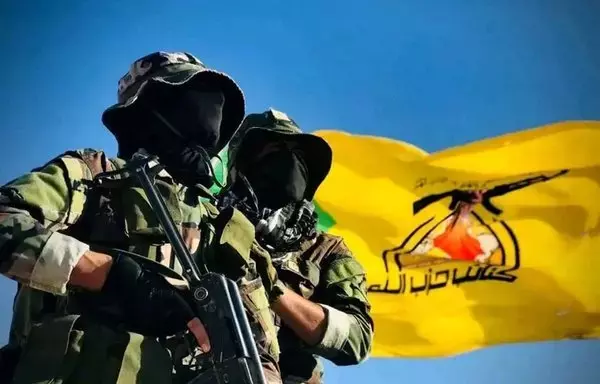Security
Iraq pursues Iran-backed militias after attacks linked to Hamas war
The expansion of the Israel-Hamas conflict via attacks carried out by Iran's proxy militias could have 'catastrophic' repercussions for Iraq.
![An Iraqi woman lifts the flag of Iran-backed militia Kataib Hizbullah during a rally to mark Al-Quds (Jerusalem) day on Baghdad's Aba Nawas street on April 29, 2022. [Sabah Arar/AFP]](/gc1/images/2023/11/02/44837-Kataib-Hizbullah-flag-600_384.webp)
By Anas al-Bar |
Against the backdrop of the Israel-Hamas war, Iran-aligned groups have launched provocative attacks on Iraqi bases hosting members of the international coalition battling the "Islamic State of Iraq and Syria" (ISIS).
Since October 17, Iran's proxies have launched at least 12 attacks with missiles and drones on Ain al-Asad base in western Iraq and al-Harir base in the north, causing minor injuries to coalition soldiers.
In statements posted on the Telegram app, a group calling itself the Islamic Resistance in Iraq claimed responsibility for most of them, and for similar attacks on coalition bases in eastern Syria.
The name points to "the unity of a group of armed militias backed by Iran" and "does not represent a specific, stand-alone group," according to the Washington Institute for Near East Policy (WINEP).

The latest wave of attacks underscores the "proxy confrontation strategy" being pursued by Iran-aligned militias, with Iran behind them, to conceal the identities of the attackers and evade responsibility for numerous previous attacks, it said.
According to WINEP and other observers, the Islamic Revolutionary Guard Corps Quds Force (IRGC-QF) is playing a "coordinating role" in the attacks.
It is facilitating the actions of its proxies and supplying them with ammunition, training and consultation, and is attempting to present them as a united front, while in reality they are always feuding over leadership and areas of influence.
'Catastrophic' repercussions for Iraq
Analysts say the recent attacks are a new indication of the militias' alignment with Iran's agenda but do not take into account the magnitude of the consequences these attacks will have on the interests of Iraq.
Getting drawn into the Israel-Hamas war as part of a "united front" of regional pro-Iran groups has dangerous implications for Iraqi national security, strategy expert Ahmed al-Sharifi told Al-Fassel.
An expansion of the conflict could have "catastrophic" repercussions for Iraq, not only on the security level, but also economically, he said.
If the escalation of tensions continues, he added, it is not possible to expect that the security situation in Iraq will remain under control.
The United States has threatened to respond "decisively and quickly" to any attempt by Iran to expand the scope of the war and endanger US interests or personnel, he noted.
It has deployed "a dozen" air defenses across the Middle East, including a Terminal High Altitude Area Defence (THAAD) anti-ballistic missile defence system.
Warships, fighter planes and two aircraft carriers also have been deployed to the region to deliver clear warning messages to Iran and its allies, he said.
The amphibious assault ship USS Bataan was spotted in the Red Sea on Wednesday (November 1), following attacks launched by the Iran-backed Houthis in Yemen, Al-Monitor reported.
Commitment to Iraq's security
Center for Political Thinking director Ihsan al-Shammari warned that Iran-backed groups are turning Iraq into a "battlefield" from which Iraqis, exhausted by previous wars, will only reap more problems and crises.
The escalation has continued, he told Al-Fassel, despite the official rhetoric supporting calm and the need for solutions to prevent the conflict from growing and spreading further into new arenas.
Iraqi military spokesman Maj. Gen. Yahya Rasul has denounced the targeting of facilities where coalition forces are stationed, and ordered that those who launched the attacks be pursued, the Iraqi News Agency reported.
In a phone call with Iraqi Prime Minister Mohammed Shiaa al-Sudani, US Secretary of State Antony Blinken urged him "to pursue those behind the attacks and fulfill Iraq's commitment to maintain the security at these installations."
In a separate phone call with al-Sudani, US Secretary of Defense Lloyd Austin thanked him for reiterating the Iraqi government's commitment to protecting international forces that support efforts to combat the activities of ISIS remnants.
Militias defy Iraqi authorities
Iran-aligned groups continue to defy the Iraqi authorities, however, disrespecting the law, the political decision-making process and official pledges by continuing to launch attacks.
To affirm their alignment with Iran, some of these groups, such as Harakat al-Nujaba and Sayed al-Shuhada, declared their explicit rejection of government warnings and demands by several parties that they stop their provocations.
Kataib Hizbullah spokesman Jaafar al-Husseini had previously announced that the Iran-backed Iraqi militia has joined the war alongside Hamas.
Kataib Hizbullah also formed an "operations room" to support the Palestinian militant group Hamas that includes two prominent Iran-backed Iraqi groups, Asaib Ahl al-Haq and the Badr Organization, according to Al-Monitor.
Why do Israel's allies have the right to support it while the allies of the resistance in Palestine do not have the right to support the resistance in Gaza?
Why this double standard, people?